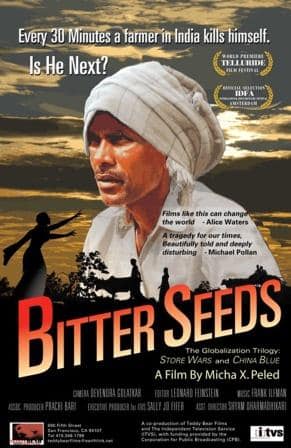CRS FILM+VIDEO SHOW & TELL will screen Micha X. Peled’s 2012 award-winning documentary “Bitter Seeds” on Friday, October 19, 2012 at 7:30 pm. Following the 87 min. screening, we will host a short discussion. Tickets are free but reservations are recommended. Reserve tickets here.
“Bitter Seeds” raises questions about the human cost of genetically-modified agriculture and the future of how we grow things and shines a light on an environmental crisis and human tragedy unprecedented in human history. This is the third film in Peled’s globalization trilogy, following the award-winning “Store Wars: When Wal-Mart Comes to Town” and “China Blue.”
In 2004, the American company Monsanto introduced its genetically modified seeds to the Indian market, promising higher yields. However, the seeds require expensive pesticides and chemical fertilizers. And the sterile seeds, unlike the conventional seeds previously used by farmers, have to be purchased again each year. Refused loans by legitimate banks, the farmers borrow from illegal moneylenders at seven percent interest per month and inevitably fall into irredeemable debt, further aggravated by low yields and a need for more fertilizer and water. Out of shame, some commit suicide by drinking Monsanto’s pesticide. Every 30 minutes a farmer in India kills himself in despair, and such deaths now number over 200,000.
The tiny miracle in this seemingly hopeless globalization tragedy is the daughter of one such farmer, a council head who was the first in his village to kill himself. Eighteen-year-old Manjusha yearns to be a journalist to expose the reasons for the suicides, but she has no mentor and certainly no encouragement. Peled’s latest heroine fights on the frontline of this global human and environmental crisis, driven by a desire to voice the perspective and preserve the dignity of the powerless.
Bitter Seeds is the final film in Micha X. Peled’s Globalization Trilogy, following Store Wars: When Wal-Mart Comes to Town and China Blue. The films won 18 international awards, aired on over 30 television channels and screened in more than 100 film festivals. They also connected viewers to NGO action campaigns and encouraged Western consumers to understand their impact on the rest of the world.
Bitter Seeds explores the future of how we grow things, weighing in on the worldwide debate over the changes created by industrial agriculture. Companies like the U.S.-based Monsanto claim that their genetically modified (GM) seeds offer the most effective solution to feeding the world’s growing population, but on the ground, many small-scale farmers are losing their land. Nowhere is the situation more desperate than in India, where an epidemic of farmer suicides has claimed over a quarter million lives. Every 30 minutes one farmer in India, deep in debt and unable to provide for his family, commits suicide.
Following a U.S. complaint to the World Trade Organization, India had to open its doors to foreign seed companies. Within a few years, multinational corporations had taken over India’s seed market in a number of major crops. Now only GM seeds are available at the shops, requiring India’s farmers to pay an annual royalty. The GM seeds are much more expensive; they need additional fertilizers and insecticides and must be re-purchased every season. While large farms have prospered, the majority of farmers find it increasingly more difficult to make a living off their land.
Bitter Seeds follows a season in a village at the epicenter of the crisis, from sowing to harvest. Like most of his neighbors, cotton-farmer Ram Krishna must borrow heavily in order to afford the mounting costs of modern farming. Required by a money-lender to put up his land as collateral, he gambles on everything he has.
When his crop is attacked by pests, Ram Krishna must do whatever he can to avoid losing the family land. Adding to his burden is another duty – his daughter has reached marrying age, and he must find the money for an expensive dowry. Ram Krishna has just become a candidate for joining the ranks of the farmers who commit suicide in despair.
Weaving in and out of Ram Krishna’s story is that of his neighbor’s daughter. Manjusha, a college student, is determined to become a journalist and tell the world about the farmers’ predicament. Her family opposes her plans, which go against village traditions. Manjusha’s ambition is also fueled by her personal history – her father was one of the suicide victims. When a newspaper reporter agrees to look at her writing, Manjusha takes on Ram Krishna’s plight as her first reporting project. Armed with a small camera from the production team, her video becomes part of the film.
The film follows the seeds salesmen from the remote village in the state of Maharashtra to their company’s headquarters. Interviews with seed industry executives (including Monsanto’s) and their critic, Vandana Shiva, flesh out the debate.
Bitter Seeds features compelling characters to tell a deeply moving story from the heart of the worldwide controversy about the future of farming.
“Films like this can change the world.” – Alice Waters
“A tragedy for our times, beautifully told, deeply disturbing.” – Michael Pollan
“Better than a Batman movie…with real villains making up their own lines.” — Peter Sellars
DIRECTOR AND PRODUCER Micha X. Peled
CAMERA Devendra Golatkar
EDITOR Leonard Feinstein
MUSIC Frank Illman
ASSOCIATE PRODUCER Prachi Bari
ASSISTANT DIRECTOR Shyam Dharmadhikari
SOUND Kaamod Kharade
PRODUCTION COORDINATOR Anand Pande

